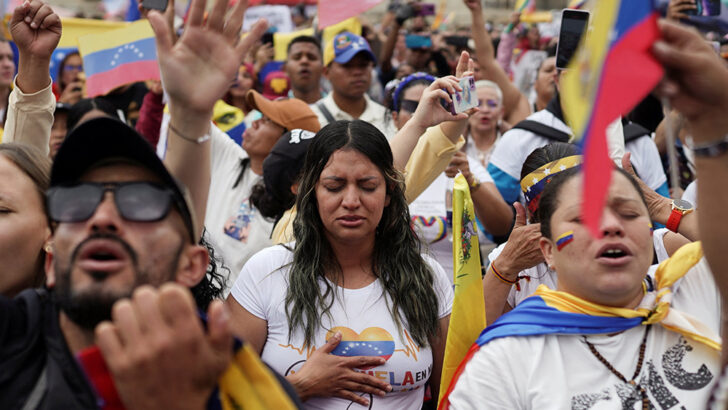Many people in Venezuela are currently paying particular attention to what the Pope and representatives of the local church are saying. While the position of the Venezuelan Church leaders is clear, Francis is being diplomatic.
For more than a week now, Venezuela has been experiencing another serious national crisis following the announcement of President Nicolas Maduro’s highly questionable election victory. Tens of thousands of people demonstrated again at the weekend against the official result and demanded proof from the government.
Meanwhile, the EU is calling for an independent review, while the USA and some Latin American countries are even recognising the conservative opposition candidate Edmundo Gonzalez as the winner of the election.
In the midst of this crisis, many people are paying particular attention to the country’s Catholic Church, which has repeatedly spoken out publicly. A letter signed by Cardinals Baltazar Porras and Diego Padron received a great deal of attention in the Latin American media. However, there is no official confirmation or denial as to whether the letter is genuine.
The letter states that the Venezuelan people have voted overwhelmingly against the incumbent president and in favour of a change in the government’s course. It is absurd to declare the incumbent Maduro the winner of the election despite this.
The Venezuelan Bishops’ Conference had previously spoken out: “We join all those inside and outside Venezuela who are calling for a review of the ballot papers with the active and full participation of all relevant political actors”, it said in a statement.
Pope Francis also made a statement. In his address at the Angelus prayer in St Peter’s Square on Sunday, the Argentinian spoke out against all forms of violence and called for dialogue for the benefit of the Venezuelan people. The Pope’s reticence, not only on this topic, has been criticised on social networks and by parts of the opposition in Venezuela.
Even before the controversial election victory, Venezuela’s former interim president Juan Guaido demanded in an interview with the Catholic News Agency (KNA): “With all due respect, I have to say that we expect more from Pope Francis”.
According to Mr Guaido, who was Maduro’s best-known opponent at times, the Vatican should publicly back clerics who are in direct conflict with dictators more. In fact, the local church does valuable social and humanitarian work to alleviate people’s suffering. “But I am sure that on a political level, the Vatican can do much more for the oppressed peoples,” said the opposition politician living in exile.


 A Venezuelan woman living in Colombia reacts during a protest at the Plaza de Bolivar in Bogota, Colombia, August 3, 2024, held in support of the opposition amid the disputed Venezuelan presidential election. Photo: OSV News/Nathalia
Angarita, Reuters.
A Venezuelan woman living in Colombia reacts during a protest at the Plaza de Bolivar in Bogota, Colombia, August 3, 2024, held in support of the opposition amid the disputed Venezuelan presidential election. Photo: OSV News/Nathalia
Angarita, Reuters. 